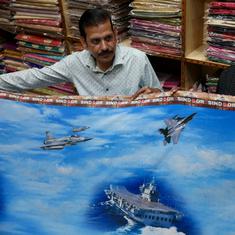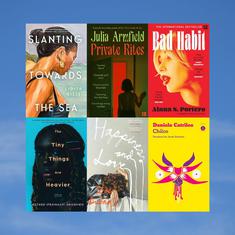I remember Mayya putting on an enormous feast to celebrate our move to the new house in Muscat. She invited all of her friends and she had to spread out a very long tablecloth to hold all of the food. Salim was in elementary school then, and Muhammad seemed a perfectly ordinary nursing baby. Mayya was happy and sparkling that night. After the party she slipped on her dark blue night shirt.
Do you love me, Mayya? I asked her, once everyone else was asleep. She was startled, I could see that. She said nothing and then she laughed. She laughed out loud, and the tone of it irritated me. Where did you pick up these TV-show words? she asked. Or maybe it’s the satellite dish out there. It’s the Egyptian films, have they eaten up your mind?
Muhammad, trying to stand up on my knees, and then tugging hard at my beard. Mayya slapped him, and he cried. I never dared shave off my beard until after my father died. And when they started literacy classes, Mayya entered the sixth year straight away, since she already knew how to read and write as well as having some basic maths.
Mayya, I said to her, Muhammad is still tiny. Go to school when he is older. I want to learn English, she said.
That was before we got the dish at home. And surely, when I asked my question – Mayya wearing the dark blue night shirt – when I asked whether she loved me, that dish hadn’t appeared yet, and I wasn’t following any TV programmes or watching any Egyptian films...
Then, my father, declining fast, in the Nahda Hospital. When I stuck my hand out to meet his, he knocked it away. When I marched in his funeral, my knees abandoned me. Muhammad was only a year old then.
And when I asked Mayya, Do you love me? she laughed. She laughed! Loud enough to shatter every wall in the new house. Her laughter...the children fled from it.
Mayya never watched TV serials. Salim loved the Mexican serials for a time but eventually they bored him and he threw himself into video games instead. Every time we went to Dubai he bought two or three games.
Mayya’s mother saying to me, Mayya’s my darling daughter. Abdallah, my son, she’s in your care now, and you must take care of her. But don’t take her away, don’t take her from me, away to Maskad. No one is better at the sewing machine than she is. Mayya doesn’t like to eat much, or to talk much, you know, Abdallah...
Earlier, much earlier: me, saying to my father, Please, Father! I want to go to Egypt or Iraq, I want to study at university there. He grabbed me by the neck and barked at me. By this beard of mine, I swear you are not leaving Oman. Do you want to sink so low? To come back from Egypt or Iraq with your beard shaven off? Smoking and drinking and I don’t know what? Is that who you want to be? So instead, immediately after finishing high school I went to work in his business.
It wasn’t until after he died that I could move the family to Muscat. Little London was very cute and she had filled out by then. In the village, every afternoon Mayya bathed her in the falaj. Scampering along the canal with its running water always made her laugh. I bought her Heinz baby food and Milupa baby cereals and powdered formula. She was the only child in all of al-Awafi who got such things. I bought them at the canteen and Mayya boasted of having them.
But my father still shouted at me, calling me boy. I was the father of three children, I was no boy...
Going in to see him in there, and he would start at it again, stripping off his dishdasha and his vest. His sparse white chest hair caught the pale sunlight slinking around those heavy curtains closed over the only window. I went over to open them but he shook his finger at me: Iyyaaka, boy! Watch out you don’t! So I left them as they were.
He went on shouting, in one of those bouts of raving that took over his mind for most of the two years before his death. Boy! Boy! Tie Sanjar up, tie him to the column on the east side of the courtyard, out there, out in front of the house. Anyone who gives that slave water or shade has to answer to me. I knelt down beside him. Father, the government freed the slaves a long time ago, and then Sanjar went to Kuwait. (Every summer London would say, Papa, let’s visit Kuwait! But Mayya always rejected the idea: So we’re going to get away from this heat by escaping to somewhere hotter?)
An Omani married Sanjar’s daughter and she came back with him to live in Muscat. When she saw me in the Nahda Hospital, where she worked as a nurse, she recognised me. At the sight of my father, who was very ill by then, her lips contorted.
My father calls out, weakly, his fever-black lips trembling. Tie up that slave, tie up that Sanjar so he won’t steal a sack of onions ever again. I remain silent and he waves his cane at me in fury. Boy, can’t you hear me? Listen to what I’m telling you – go and punish him, go, it’s the only way he won’t steal any more.
London playing in the water, which she loved. London was six when Mayya chewed me out one time for leaving her to play in the muddy flow of water for two hours. London will get polio, she warned me. London will be paralysed. I couldn’t sleep for several nights, and I couldn’t take my eyes off her tiny feet. But she didn’t come to any harm. She went on scampering around like a miniature gazelle.
My father’s lips turned black, his eyebrows receded, and the spit flew in all directions from his mouth. Boy – have you tied that thieving slave Sanjar to the eastern column yet? I took his hand and kissed it but he pushed me away. Father, the government freed all of the slaves, and Sanjar...the government, Father. He growled under his breath as though he had finally heard me.
What’s the government got to do with it? Sanjar is mine, he doesn’t belong to the government. The government can’t free my slaves. I bought his mama Zarifa for twenty silver thalers! I fed her, when a sack of rice cost a hundred pure good silver coins. Yes, that’s right, a hundred. One thaler knocking against the next! Aah, Zarruf, so pretty...soft and gentle, Zarruf, but then you got older. Aah, that one grew vain and cocky! I married her off to Habib and then she produced this thief. What does the government have to do with any of this? My slave, mine. How could he travel anyway, without getting permission from me? How, boy?
When he began to shiver and quake again, the sweat running down his neck and oozing across his chest, I wiped it away with the blue towel which was always hanging on a nail on the door. After he died, that towel of his vanished. Going into his room, crying uncontrollably, knocking against the floor and writhing in my sweat, I would look for the towel but I could never find it. The Farrasha sewing machine vanished too. I never go into the storeroom but I know Mayya is hiding it somewhere in there.

Excerpted with permission from Celestial Bodies, Jokha Alharthi, translated by Marilyn Booth, Simon & Schuster.










